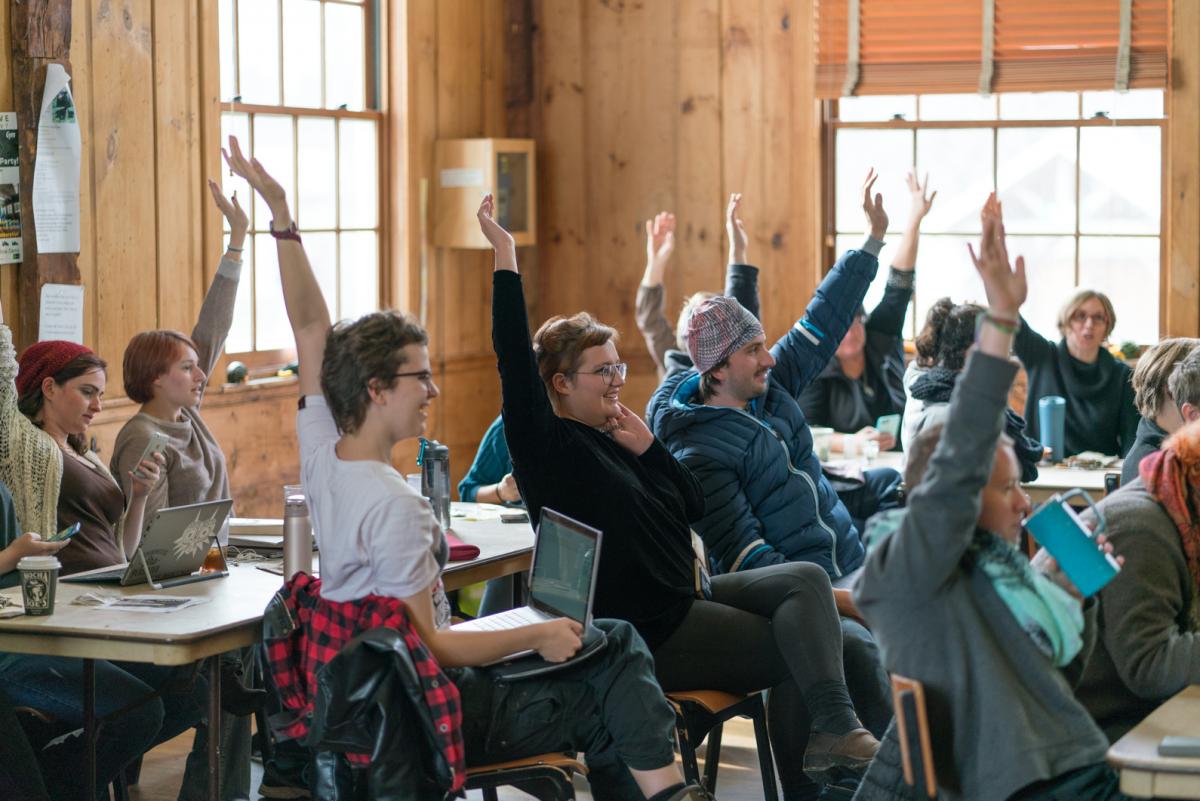New Course Supports Community Governance

Although many students are drawn to Marlboro’s focus on community engagement and shared governance, some have found it difficult to integrate their community work with their course of study—until now. A new course called Community and Governance Colloquium, proposed by the Curriculum Committee last fall and piloted last spring semester, stands to make Marlboro’s shared governance model a more deeply integrated part of a Marlboro education.
“There are so many shared skills gained by designing your own education and by having a voice in governing the campus,” says dance professor Kristin Horrigan, a member of the Curriculum Committee who is co-teaching the course this fall. “But students who come in excited about Town Meeting, committees, and community leadership roles were telling us that they had a hard time seeing and feeling the connection between community work and their academic work, especially in their first few years. This course is a way to build a clearer bridge.”
The new course grew out of the Curricular Innovations Action Planning Group, which Kristin was also a part of, who recommended that the faculty work to create a link between the governance model and the curriculum. It also builds on a group tutorial taught by math professor Matt Ollis and Helen Pinch ’18, who were part of the same action planning group during the fall of 2017 when Helen was serving as head selectperson.
“In the curricular innovation group, Matt and I had been talking about marrying academics with community governance, and trying to find a common thread that defines a Marlboro experience,” says Helen. “Instead of Plan being just an individualized, isolating experience, we wanted to include within the Marlboro experience this element that is much more expansive— of being an autonomous individual, but in a self-governing community.”
Matt and Helen’s tutorial supported students to go beyond their roles in community governance and do larger projects that were linked to their studies. For example, junior Eric Wefald created a handbook for the position of public advocate, a key community leadership position tied to Community Court. “At Marlboro, I believe we aim to put our democratic values into action,” says Eric.
The first Community and Governance Colloquium was taught by Matt and chemistry professor Todd Smith last spring, and included research and writing projects relating to Title IX, the Real Food Challenge, Town Meeting, and the role of the Town Meeting moderator. Part of the rationale for offering it as a course is that it is more visible to prospective students as well as more accessible to new students who are not yet doing tutorial work.
“I loved having conversations with the others in the class about what we like and what frustrates us regarding Town Meeting and the way Marlboro’s governance works,” says sophomore Phoenix Bieneman, who served as Town Meeting moderator last year. “I learned a lot, and I also found that we were able to talk about possible solutions.”
“I enjoyed the students’ dedication to the spirit of community engagement and self-governance, and it was exciting to see the commitment they had to their projects,” says Todd. “They were all quite committed, both to contributing their voices in campus governance, and to advocating for real change on campus.”
Students in the course apply academic skills to deepen their work on committees and in community roles. Each student crafts their own “work contract” with the faculty running the course so their assignments are shaped around the work they’re doing in the community. The course also includes some communal skill-building, in the form of workshops with guest speakers, shared readings, group projects, or discussions, to address gaps students may experience when diving into community work.
“I am looking forward to the chance to formalize the bridge between my teaching and the things I’ve learned from 12 years of participation in community governance at Marlboro,” says Kristin, who is co-teaching the course this fall with American studies professor Kate Ratcliff. “Working with Kate and a group of students whom I don’t usually see in my classes will be a treat, and it will offer us all a chance to deepen our understanding of our community while helping to strengthen it at the same time.”
